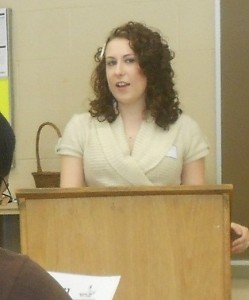 Brooke Schuldt (2010), who is the entertainment editor for The Beacon (the student-run newspaper at William Paterson University), visited Theresa DiGeronimo’s journalism class to give students tips on journalism in the real world.
Brooke Schuldt (2010), who is the entertainment editor for The Beacon (the student-run newspaper at William Paterson University), visited Theresa DiGeronimo’s journalism class to give students tips on journalism in the real world.
Schuldt also shared her experience as a freelance writer for newspapers and magazines such as Main Street Magazine, a local magazine mailed out in towns such as Glen Rock, North Haledon and Hawthorne. “With entertainment editing and writing, you can colorful; you can be frilly; you can have more fun with what you are writing,” Schuldt told the class. She explained that people can sit down and take a minute to read entertainment articles as opposed to hard news that is read quickly before work or school. When writing news blurbs about something, Schuldt said that a writer needs to be more specific to fit the details in such a small area.
The Beacon is a student-funded newspaper competing with the Pioneer Times, a school-funded newspaper. Schuldt explained that many students at William Paterson University prefer the student-run newspaper due to its flexibility to print articles even if they do not meet with the University’s approval. Schuldt then led the students in a discussion about censorship in school newspapers.
Deadlines are also always an issue for journalists. Schuldt explained: “You have a small window of time that you can get something in there.” She then went on to say: “Deadlines aren’t only stressful for the reporters and writers, but they are also stressful for the editors.” Schuldt told the class that while reporters and writers are stressing over getting the article in, editors are depending on those articles to come in on time or earlier to prevent the need to stay up late to put the newspaper together.
Schuldt also told the class how important it is to fact check work. “You don’t know how important fact checking is until you make a mistake and everybody criticizes you.” Schuldt explained her own mistake as an editor allowing an error to be printed for The Beacon that resulted in the anger of a specific ethnic group. “As an editor, you have to fact check to an extreme extent,” Schuldt told the class. She explained that although fact checking and editing should be done by the writers, there is always a mistake that the editor must notice and fix. Schuldt also said that the time it takes to edit, fact check, layout the pages, and send to the printer can be exhausting.
In her presentation, Schuldt critiqued specific articles presented in the HHS Clarion that she found most interesting. While most the articles impressed Schuldt, there’s always room for improvement, which she was willing to provide.
